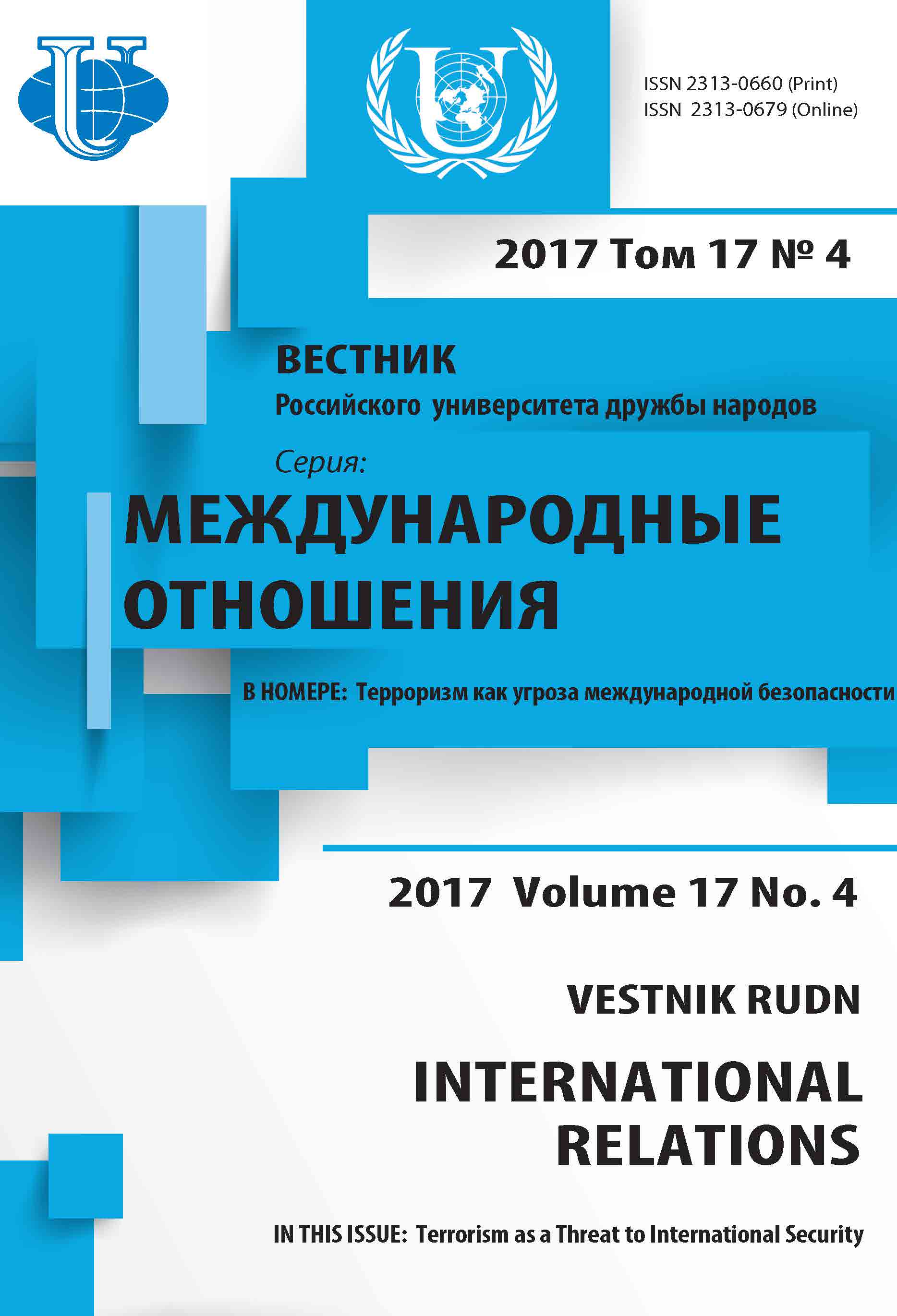SAUDI ARABIA: INTERIOR ORIGINS OF TERRORISM
- Authors: Kosach GG1
-
Affiliations:
- Russian State University for the Humanities
- Issue: Vol 17, No 4 (2017): Terrorism as a threat to international security
- Pages: 639-654
- Section: THEMATIC DOSSIER
- URL: https://journals.rudn.ru/international-relations/article/view/17525
- DOI: https://doi.org/10.22363/2313-0660-2017-17-4-639-654
- ID: 17525
Cite item
Full Text
Abstract
The article is analyzing problems connected with formation of anti-system terroristic underground in Saudi Arabia as a direct result of religion’s liberation from State control. The main reason for this phenomenon was political alliance, which preserved its importance until nowadays, between the dynasty, represented by ruling family Al Saud and corps of Ulama, represented by descendents of Muham-mad Ibn Abdel Wahhab - family of Al ash-Sheikh. Internal conflicts of this alliance ultimately defined the appearance of opposition, which proclaimed the basic doctrines of Wahhabi version of Hanbali Islam, in the political arena and its transformation to the main enemy of present Saudi statehood. The author highlights the main periods of confrontation between Saudi power and anti-system opposition, which is applying to religious dogmatic. He describes rebels of Ikhwans in the 1920th, the capture of Haram al Sharif in Mecca by group of Al Uteibi in November 1979, the movement of stray sect in the end of 1990th - the beginning of 2000th and the terrorist activity in Saudi Arabia in recent period, which is associated by the Saudi power with ISIS. Using the methods of systemic analysis, the author concluded that the religious element, which is the base of Saudi political system represents a factor of opposition’s argumentation to prove the power’s neglecting its duties to conserve “the purity” of religious grassroots of the society and the state. This fact is important because the process of modernization, which is taking place in Saudi Arabia, causes the fall of official Ulama’s corps authority and appearance of oppositional Ulama, which legitimize the activity of terroristic groups, creating first of all from the originals of depressive regions of the country, and are inspired by ideology of ISIS.
About the authors
G G Kosach
Russian State University for the Humanities
Author for correspondence.
Email: g.kosach@mail.ru
Kosach Grigory Grigor’evich - Doctor in History, Professor of the Department of Modern East, Faculty of History, Political Science and Law, Institute for History and Archives, Russian State University for the Humanities
References
- Al-Huqeil, S. (2000). Huquq al-insan fi al-islam wa tatbiqutuha fi Al-Mamlaka Al’Arabiya Al-Saudiya. Riyadh. (in Arab.)
- Al-Qudeimi, N. (2013). Al-Muhafidhun wa al-islahiyun fi al-hala al-islamiya as-saudiya. Beirut: Al-Markaz ath-thaqafi al-‘arabi. (in Arab.)
- Bin Baz, А.А. (2000). Al-Nizam al-siyasy wa al-dustury li Al-Mamlaka Al-‘Arabiya Al-Saudiya. Riyadh: Dar Al-Khurreidji. (in Arab.)
- Ibrahim, F. (2009). Al-Salafiya al-jihadiya fi Al-Saudiya. Beirut: Dar al-saqi. (in Arab.)
- Kosach, G. (2007). Saudi Arabia: internal political Process in the “Stage of Reforms” (the end of 1990th — 2006). Moscow, Institute of the Middle East. (in Russ.)
- Kosach, G. (2013). Saudi Arabia: the Power and the Religion. Politicheskaya Nauka, 2, 100—125. (in Russ.).
- Kosach, G. (2014). Saudi Arabia: the Power and the Religion’ Opposition. Middle East in Modern Times, 48, 50—111. (in Russ.).
- Kosach, G. (2016) Saudi Arabia: the National Unity without Pluralization. Politicheskaya Nauka, 1, 60—79. (in Russ.).
- Kosach, G. (2016). Saudi Arabia: the State and the Politics. World Economy and International Relations, 60 (9), 48—56. (in Russ.).
- Kosach, G. (2016) Saudi Arabia: the State and the Construction of “National” Identity. In: The Cultural Complexity of the Modern Nations. Ed. by V. Tishkov, E. Filippova. Moscow: Institute of Ethnology and Ethnography of the Russian Academy of Sciences. (in Russ.).
- Kosach, G. (2005). The Terrorism and the Political Culture in Saudi Arabia. In: Islam and the Social Development in the beginning of the XXI century. Ed. by V. Belokrenitsky, A. Egorin and N. Ulchenko. Moscow: Institute of Oriental Studies of the Russian Academy of Sciences, p. 171—197. (in Russ.).
- Lacey, R. (2012). Al-Mamlaka min al-dakhil. Dubai: Markaz Al-Misbar. (in Arab.)
- Mouline, N. (2011). Les clercs de l’islam. Autorité religieuse et pouvoir politique en Arabie Saoudite XVIII e — XXI e siècles. Beyrouth: Centre arabe des recherches.
- Vasilyev, А. (1982). Тhe History of Saudi Arabia. Moscow: Nauka. (in Russ.).
Supplementary files










